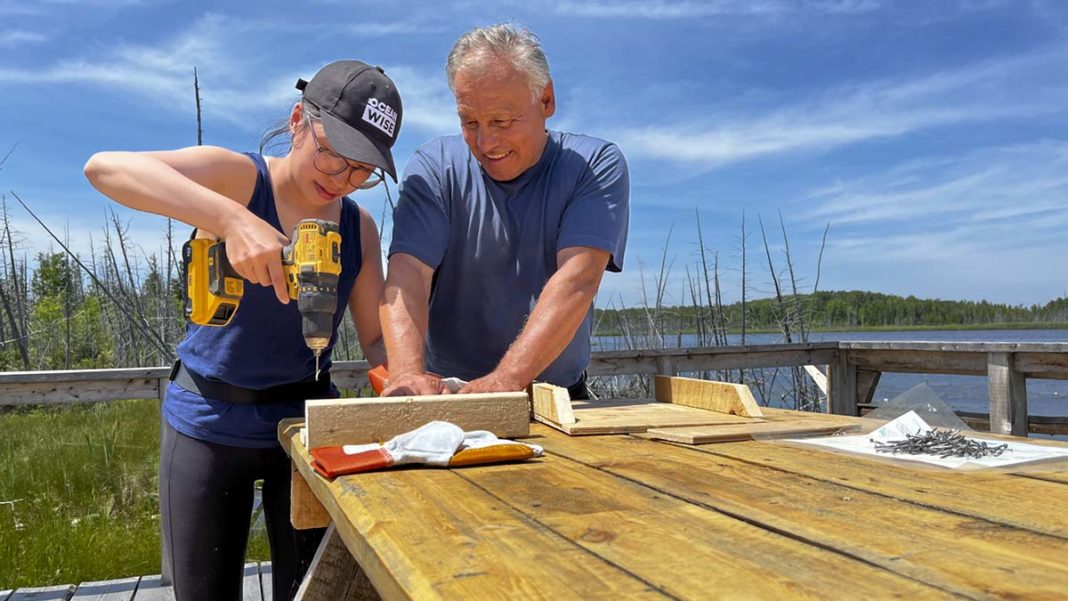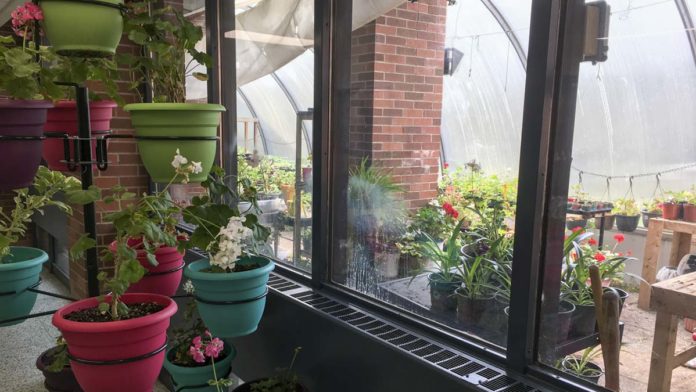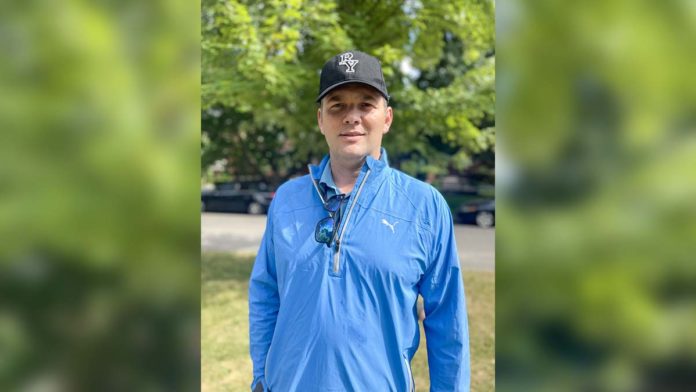WIIKWEMKOONG—Youth ambassadors from Ocean Bridge recently embarked on an immersive cultural and environmental learning journey, in partnership with Wikwemikong Tourism, Wikwemikong Heritage Organization and Wiikwemkoong’s Lands and Resources department. Ocean Bridge, a division of Ocean Wise, connects youth and young professionals across Canada and empowers them to make a difference toward ocean conservation.
The six-month part-time program provides ambassadors with the tools to position themselves as change makers in their communities and beyond, said Rachel Morningstar, Great Lakes manager for Ocean Bridge.
The Great Lakes is one of four regions covered under the program, added Jacqueline Thompson, assistant manager, Great Lakes, Ocean Bridge. “While we focus on the Pacific Ocean, the Arctic and the Atlantic Ocean, when we look at the Great Lakes region we consider it an inland sea,” she told The Expositor. “It all goes out to the ocean. It all connects to the ocean, whether that’s two of the three breaths that we take, whether that’s the water that we drink or it’s the freshwater that’s affected by ocean pollution, climate change and ocean plastics.”
The 10-day learning journey is usually co-delivered with Indigenous partners “who know the land the best, its history, and also to help us better understand complexity of interconnection of the underlying threats of our aquatic habitats,” explained Ms. Morningstar. “Our hopes were that our Great Lakes ambassadors could learn traditional land and water protection and knowledge of the Great Lakes from Wiikwemkoong Unceded Territory, and then also be inspired to lead environmental service projects in their local communities that are focused on addressing ocean and freshwater conservation across Canada,” she continued.
The Expositor reached out to Luke Wassegijig at Wikwemikong Tourism and Doris Peltier at Wikwemikong Heritage Organization. Ocean Bridge’s goal aligned with group programming offered by Wikwemikong Tourism, noted Luke Wassegijig, Wikwemikong Tourism manager. He gave credit to Naomi Mishibinijima, who “connected the dots” and helped build the itinerary with the Ocean Bridge team. The collaborative effort, with the Heritage Organization and Lands Department, “was a great opportunity for us to share, to educate, to have the group here on our territories,” he said. “Wiikwemkoong covers a vast area throughout the islands and throughout Killarney so it was a good opportunity for them to see everything.”
The Ocean Bridge cohorts visited Wiikwemkoong from May 27 to June 5 and from June 17 to 26. “We were introduced to sustainable fishing. We were introduced to a water walking ceremony with a ceremony leader. We celebrated National Indigenous Peoples Day where our ambassadors volunteered, taking data of people who were attending,” Mr. Wassegijig said. The group also went on a Baie Fine cruise, visited Lake Topaz, and worked with Water Rangers testing kits.
Ambassador Nicole Doray teaches climate science and human-centered design in Toronto. “Where I’m really passionate is bridging climate science with traditional ways of knowing and reconciliation is incredibly important to me,” she said. “This is an opportunity for me to learn and the community has been so overwhelmingly generous with their knowledge and their time. I got into it looking for a learning opportunity and to build new relationships. We had Doris and Norma take us on a water walk and that was so powerful and so moving, just an experience that I think most of us, myself included, will hold close to our hearts for a very long time. Their generosity, their kindness, it’s an overwhelming feeling coming into a community looking to learn and with the hope of building relationships and find that you’re so well received.”
“From what they’ve shared, after attending the water walk, it’s really helped to raise the importance of water and why we need to protect it,” Ms. Morningstar said. “It was a very grounding experience for them. One of those important things is we need to protect the medicines in and around the water and if the water’s polluted, this affects the medicine. This was just an example of what we learned about why we need to also protect the water.”
The water walk was led by water walkers Norma Peltier and family, as well as relatives Mark Shigwadja, Michelle Roy, May Roy and Shauna Pitawanakwat.
For most of the ambassadors, attending the powwow was another first. “We were just there and very open to receiving the experience and hoping to be a positive presence there and a positive energy as spectators,” Ms. Doray said. “Stitch (Manitowabi) came over to our group and said ‘everyone, get up and dance and participate.’ I think we were very conscious of our positionality as non-Indigenous folks coming into the community and we wanted to be very respectful. I think we needed permission to participate in that way. We all got up and danced around the circle and it was such an energizing, community-building experience. Again, I just feel so overwhelmed by their generosity of time. That was just a big moment for me personally and I think for most of us.”
Ambassador Joanna Tucci holds both bachelors and masters degrees in environmental biology. She’s always been passionate about animals and the environment and wanted to help in some way. When she saw a friend’s social media posts from the 2021 Ocean Bridge program, she couldn’t wait to apply. “I wanted to gain more knowledge and experience in the environmental biology field and to come out of it with something and help my career a bit,” she said.
Ms. Tucci works in conservation biology for the Toronto Region Conservation Authority (TRCA), teaching different programs to school groups. After this trip she’s starting a new job within TRCA, an eight-week research contract doing research on wetlands. “My thesis was on using native non-invasive plants in wetlands so that’s why I’m really excited for today at the marsh,” she said.
Both groups spent their final day in Wiikwemkoong with Species at Risk coordinator Theodore Flamand and his team, ending up at Meshkoodayang Shkoo sii (Prairie Point marsh) outdoor learning environment, where they cleared an area for tree planting by school children and built bat houses, while also learning about species at risk, native species and ecosystem survival.
“This is pretty life changing, to be honest,” Ms. Tucci said.
“You talk about being impactful,” said Mr. Wassegijig. He noted that for Wikwemikong Tourism’s Noah Manitowabi, the experience reminded him how important their work is. “This is exactly why he’s doing what he’s doing. It’s impactful. He actually felt that there was a connection that was made. I think that’s the importance of the work we do here. It’s not only about Indigenous tourism. It’s also about connecting and sharing stories of the land with the people.”
When reminded of how the experience had impacted Ms. Doray’s understanding of reconciliation, Mr. Wassegijig pointed out that’s where the heart of our programming from Wikwemikong Tourism comes from. “Before we start with any group, the first thing is understanding the people,” he explained. “Understanding the connection to the land. Fostering that piece of reconciliation. Reconciliation starts with knowing the history of the land, so we start all of our experiences with our unceded journey. Although we did a modified version of it with Ocean Bridge, it gives them an opportunity, as soon as they’re engaged with us, to learn the history because that’s where it starts. That’s where reconciliation starts. It starts with knowing the people and the place and the connection to the people and the place.”





